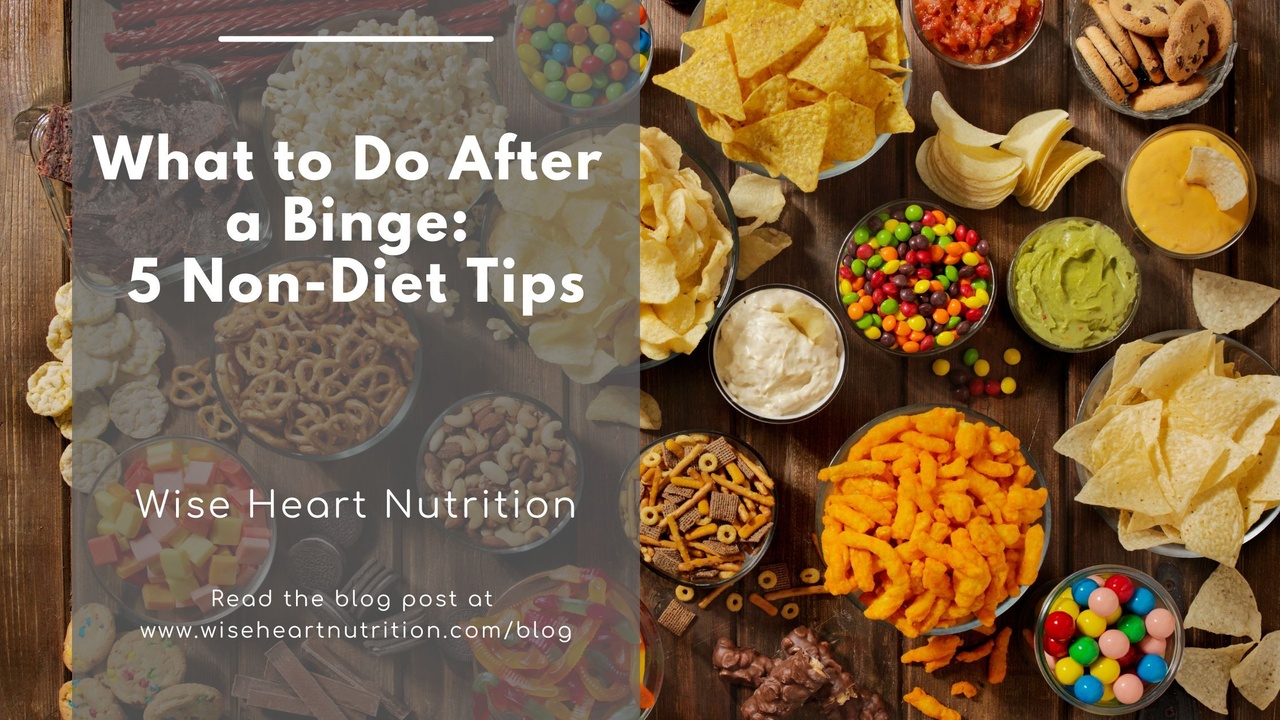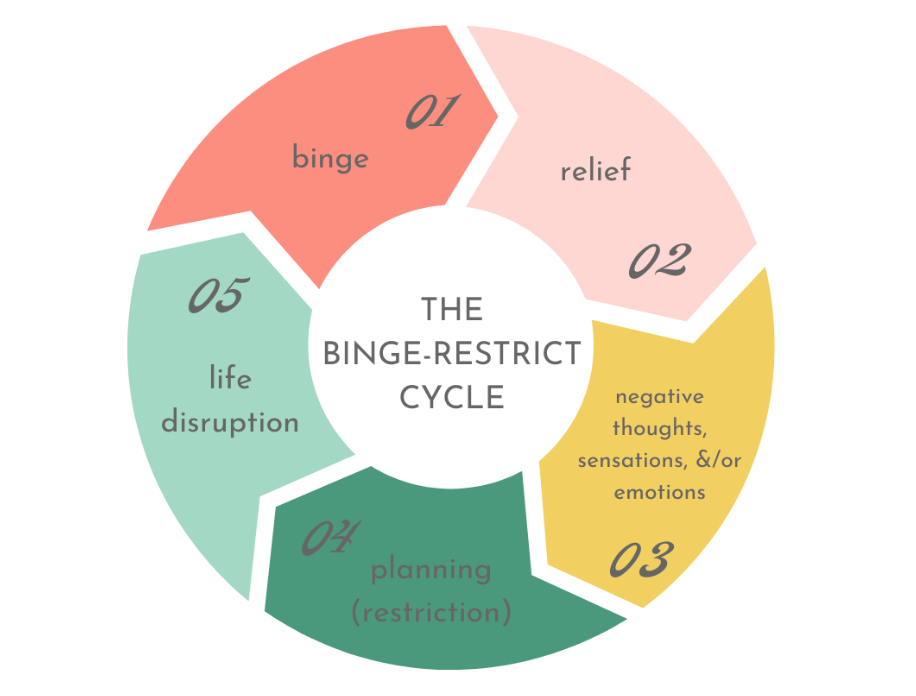What to Do After a Binge: 5 Non-Diet Tips

So, you've just experienced a binge eating episode... What do you do now?
Many individuals, (especially ADHDers and folx with a history of dieting) struggle with binge or compulsive eating, and more often than not, the binge eating is automatically seen as the "problem" to be fixed. This often results in deprivation and restriction to "make up for overeating", which then leads to more binge eating. In addition, beliefs about not having "enough willpower" or "discipline", as well as guilt and shame, often show up after or during a binge due to our society creating the myth that you should, or even can, have control over food. Binge eating, negative emotions, and restriction often spirals into a vicious cycle, which can feel impossible to break.
The cycle (see graphic below) has several stages: the binge, the sense of emotional relief or numbness, the thoughts and feelings that follow, the planning, the disruption to the plan, and then back to the binge. Diet culture has taught us to respond to a binge by making a plan to not binge (“never again”, “start again tomorrow”, “do better next time”), but what we aren't told is that the plan itself is part of the ongoing cycle.

What about breaking the binge eating cycle?
Ok, so now that you understand the cycle, what can you actually do after a binge to begin to free yourself from the rollercoaster of binge eating, restricting, and more binge eating?
Get Curious
Start by taking some deep breaths, acknowledging what just happened, and tapping into curiosity. Take a moment to explore why the binge happened without judgment. Were you feeling heightened emotions today, recently, or in the moment? What need were you trying to fulfill? Could there have been a different way to meet that need? Did you go a long time (5+ hours) today without eating? You may binge to intentionally distance yourself from your emotions or experience, so this may be uncomfortable, but it is so helpful.
Practice Self-Compassion
If shame and guilt were effective tools for bullying you into changing a behavior, it would have worked by now. Though it may seem counter-intuitive or even uncomfortable, self-compassion is how we acknowledge and validate our experience, while offering ourselves the grace and space to change. Step one might simply be acknowledging that binge eating was an attempt to help yourself in some way or another. When you binge, you are likely coping the best you can, with the tools you have at that moment. While binge eating may help in some ways, practicing self-compassion can allow you to expand your toolbox of coping skills that might be more sustainable or effective. Beating yourself up and spiraling into shame will only fuel the cycle.
Return to Regular Eating
Don't make a plan to restrict, avoid, get rid of, or limit foods. Don't plan to "have a fresh start tomorrow". Don't plan to "never binge again". These restrictive goals will also reinforce the cycle. Instead, respond by returning to a regular eating pattern, starting with the next meal or snack. If you binge late at night, you still need to eat breakfast. If you binge mid-day, your body will still require fuel in the evening. If you feel full or sick at that point, try to eat something small and easy to digest.
Challenge Beliefs about "Good" and "Bad" Foods
Notice the types of food you tend to binge on - this may be carbs, sweets, or foods that often get labeled as “bad”. Give yourself permission to have these restricted foods more regularly as parts of meals and snacks, in order to decrease the novelty, power, and pull that they hold. There is a place for all foods to fit into our diet. Seeing all foods as morally equal can help to decrease the shame spiral and break the binge/restrict cycle.
Find connection
Reach out to a friend, family member, or provider that you trust, and share about your experience. Find Intuitive Eating and Anti-Diet accounts on social media and read through / respond to posts and comments. Binge eating can be very lonely because of the stigma attached to it. It may also be a behavior you intentionally engage in alone in order to self-isolate. But humans are social creatures, and we need connection to survive and thrive. When you feel less alone in the discomfort, there is more space for healing and compassion.
TLDR; Final Thoughts
Next time you binge eat, experiment with resisting the urge to make a restrictive plan, and instead try responding to yourself with curiosity, compassion, and care. You may engage in binge eating to intentionally disassociate from your experience/emotions, but then find yourself spiraling in shame, and falling back into the belief that you must restrict to stop this cycle. However, coming back into your body through curiosity, practicing self-compassion, and continuing to care for your body and mind, is actually how you can set yourself free. And remember, this isn’t something that happens overnight, but if you can begin to break the cycle one day at a time, you will find freedom and joy in your relationship with food.
Want support breaking the binge eating cycle!? The registered dietitians on our nutrition therapy team can help! Learn more about who we are, and schedule your FREE discovery call with one of our providers today, to see if one-on-one nutrition counseling would be a good fit for you!

